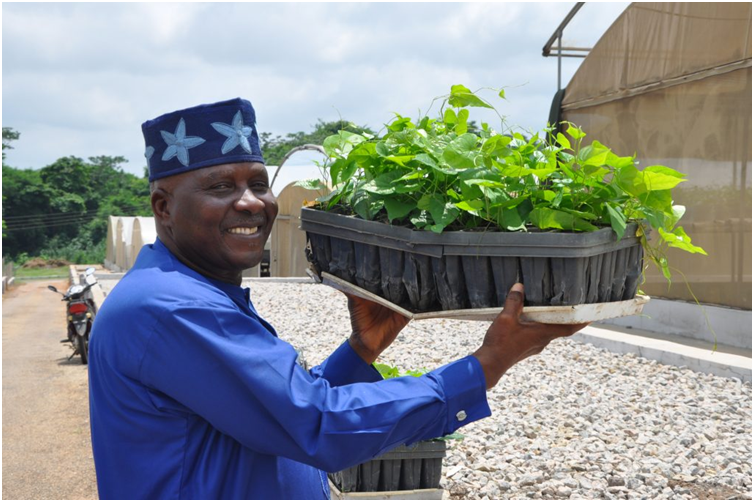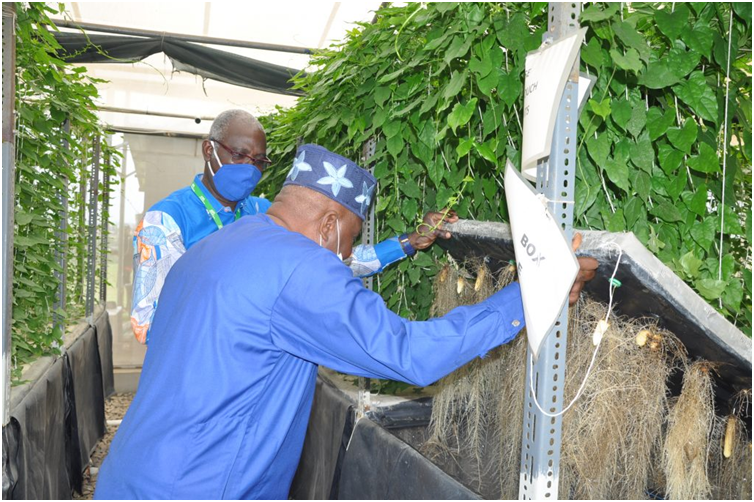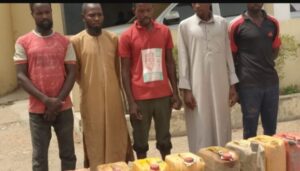Chief Executive Officer of Napetsa Farms, Joseph Adewale Fosudo, has visited the International Institute of Tropical Agriculture (IITA) to learn about using single-vine seedlings from High Ratio Propagation Technologies (HRPTs) for seed yam tuber production.
Fosudo, considered a top commercial yam farmer has been growing yam for decades in Epe, Lagos, and in northern Nigeria.
According to him, “I came because I am particularly interested in using vine seedlings derived from technologies like the Aeroponics System (AS) for seed yam tuber production. I supply yam to well-known food outlets in Nigeria and major processors who export frozen yam chips and cubes to the west for consumption by Africans in the Diaspora.
‘’Demand for yam is growing, but the availability of inputs like seed yam is not keeping up with demand. But IITA, like in the past—for many other situations—has a solution. That is why I am here.”
The Yam Improvement for Income and Food Security in West Africa (YIIFSWA-11) Project Leader, Norbert Maroya, however, received him and took him around the campus to showcase HRPTs.
Maroya is an agricultural engineer specialising on plant breeding with a Ph.D. from the Department of Botany, University of Ghana Lagon. He worked from April 1985 to July 2000 in agricultural research in various positions starting as head of the Cassava breeding programme of the National Agricultural Research Institute of Benin (INRAB).
In August 2000, he joined the German Technical Cooperation as Regional Expert for Planting Materials of Root and Tuber Crops for the “Promotion of Seed Production and Marketing in West Africa”. In May 2002, he was recruited by IITA as Regional Coordinator of the West Africa Seed and Planting Material Network (WASNET), based in Accra, Ghana, where he worked till February 2007.
He joined the International Crops Research Institute for the Semi-Arid Tropics (ICRISAT) as Regional Coordinator of the USAID-funded West Africa Seed Alliance (WASA) based in Bamako, Mali, from 2007 to 2009. From November 2009 to August 2010 he worked as Senior Advisor on Seed Policy and Public Partnership of WASA.
He returned to IITA in September 2010 as cassava breeder/geneticist based in Ibadan, Nigeria. He was in charge of breeding and selection of beta-carotene- enriched cassava.
His areas of expertise includes seed project management, seed systems development, seed quality control and certification, foundation seed production, breeder seed maintenance, seed industry development, and seed marketing, among others.
Since February 2012 he has been the Project Manager of YIIFSWA funded by the Bill & Melinda Gates Foundation.
However, the YIIFSWA project seeks to develop and establish a functional, commercial seed yam seed system in Nigeria and Ghana to benefit smallholder farmers through timely and affordable access to high-quality seed yam tubers of improved varieties.
They visited the aeroponics and the Hydroponics Systems (HS), and the single-node vine cuttings nursery to see how yam seedlings are produced using the novel technologies.
Fosudo saw how vines cut from the aeroponics system are propagated in a nursery screen house before being transplanted to the field.
On the field, he saw AS-derived vine seedlings growing under rain-fed conditions thriving in dense populations (up to 100,000 plants/ha).

“This entire exercise of going through the production facilities in screen houses, and on the field, showing how one can generate many nodes in one plant to multiply seed for farmers and direct cropping, was astounding.
‘’Also, the density of the plant population in the field is very impressive. And this is why I think your slogan about making people rich quickly (yams for livelihoods) is true because I have seen, practically, that it is possible to have a few hectares and produce huge amounts”, Fosudo said.
Continuing, he said, “I used to be worried about African agriculture. Researchers do a lot of work, developing technologies and best practices only to keep them on the shelves. Both government and farmers allow research results to remain on the shelves.
‘’We need to find a systematic way of relating with research organizations like IITA so that this mission to produce for Africa, Africa feeding Africans, and maintaining strategic food reserves would be a reality.”
Speaking on the yam industry, he said, “yam is green gold waiting for exploitation. So much can be derived from it if we put resources towards the development of the sector. Look at your improved variety Kpamyo, ‘the wealth-making yam’; it is already making waves in the market.
‘’ There are so many varieties that need to be assessed for value addition. The variety that I supply to a well-known food outlet is a water yam that tastes like potato but is filling like yam. Let us make yams do for Africa what potatoes are doing for western countries.”
At the end of his visit, Fosudo received 500 single-node vine seedlings to be used to kick- start his seed production. He indicated that he was going to replicate what was on the field to optimise its use.







